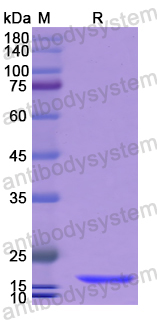Catalog No.
YHJ53001
Expression system
E. coli
Species
Homo sapiens (Human)
Protein length
Asp243-Thr382
Predicted molecular weight
18.89 kDa
Nature
Recombinant
Endotoxin level
Please contact with the lab for this information.
Purity
>90% as determined by SDS-PAGE.
Accession
Q9C075
Applications
ELISA, Immunogen, SDS-PAGE, WB, Bioactivity testing in progress
Form
Lyophilized
Storage buffer
Lyophilized from a solution in PBS pH 7.4, 0.02% NLS, 1mM EDTA, 4% Trehalose, 1% Mannitol.
Reconstitution
Reconstitute in sterile water for a stock solution. A copy of datasheet will be provided with the products, please refer to it for details.
Shipping
In general, proteins are provided as lyophilized powder/frozen liquid. They are shipped out with dry ice/blue ice unless customers require otherwise.
Stability and Storage
Use a manual defrost freezer and avoid repeated freeze thaw cycles. Store at 2 to 8°C for frequent use. Store at -20 to -80°C for twelve months from the date of receipt.
Alternative Names
Keratin, type I cytoskeletal 23, Keratin-23, Cytokeratin-23, CK-23, K23, KRT23
KRT23 as a Potential Target for Metabolic Dysfunction-Associated Fatty Liver Disease (MAFLD): Evidence From Bioinformatics Analysis, Human Gene Polymorphism and Animal Experiments., PMID:40487984
ZNF384 mediates KRT23 to promote CRC process through the TGF-β/Smad signaling pathway., PMID:40453923
WGCNA-ML-MR integration: uncovering immune-related genes in prostate cancer., PMID:40260298
miR-195-5p Inhibits Colon Cancer Progression via KRT23 Regulation., PMID:39771533
Immune checkpoint gene signature assesses immune infiltration profiles in bladder cancer and identifies KRT23 as an immunotherapeutic target., PMID:39160525
Fenofibrate-promoted hepatomegaly and liver regeneration are PPARα-dependent and partially related to the YAP pathway., PMID:39027236
Loss of keratin 23 enhances growth inhibitory effect of melatonin in gastric cancer., PMID:38099343
Identification of Breast Cancer Metastasis Markers from Gene Expression Profiles Using Machine Learning Approaches., PMID:37761960
Genome-Wide CRISPR-Cas9 Screening and Identification of Potential Genes Promoting Prostate Cancer Growth and Metastasis., PMID:35708078
Colorectal cancer stem cell-derived exosomal long intergenic noncoding RNA 01315 (LINC01315) promotes proliferation, migration, and stemness of colorectal cancer cells., PMID:35470736
Identification and verification of key cancer genes associated with prognosis of colorectal cancer based on bioinformatics analysis., PMID:34911835
Identification of Key Genes Associated with Progression and Prognosis of Bladder Cancer through Integrated Bioinformatics Analysis., PMID:34885040
Screening of immunosuppressive cells from colorectal adenocarcinoma and identification of prognostic markers., PMID:33646276
A 4-gene signature predicts prognosis of uterine serous carcinoma., PMID:33579221
The Overexpression of Keratin 23 Promotes Migration of Ovarian Cancer via Epithelial-Mesenchymal Transition., PMID:33204716
Identification of Genes Related to Clinicopathological Characteristics and Prognosis of Patients with Colorectal Cancer., PMID:32027181
Distinct signatures of lung cancer types: aberrant mucin O-glycosylation and compromised immune response., PMID:31429720
Epigenome Mapping Identifies Tumor-Specific Gene Expression in Primary Rectal Cancer., PMID:31404997
Identification of Keratin 23 as a Hepatitis C Virus-Induced Host Factor in the Human Liver., PMID:31216713
The identification of a common different gene expression signature in patients with colorectal cancer., PMID:31137244
Genetic mutational status of genes regulating epigenetics: Role of the histone methyltransferase KMT2D in triple negative breast tumors., PMID:30990809
Keratin 23 Is a Peroxisome Proliferator-Activated Receptor Alpha-Dependent, MYC-Amplified Oncogene That Promotes Hepatocyte Proliferation., PMID:30697791
A gene expression signature-based nomogram model in prediction of breast cancer bone metastases., PMID:30575323
Effect of Productive Human Papillomavirus 16 Infection on Global Gene Expression in Cervical Epithelium., PMID:30045992
Insights into the role of hepatocyte PPARα activity in response to fasting., PMID:28774777
Keratin 23 promotes telomerase reverse transcriptase expression and human colorectal cancer growth., PMID:28749462
Neotenic phenomenon in gene expression in the skin of Foxn1- deficient (nude) mice - a projection for regenerative skin wound healing., PMID:28068897
LPS-TLR4 Pathway Mediates Ductular Cell Expansion in Alcoholic Hepatitis., PMID:27752144
Keratin 23 is a stress-inducible marker of mouse and human ductular reaction in liver disease., PMID:27151178
Isocaloric high-fat feeding directs hepatic metabolism to handling of nutrient imbalance promoting liver fat deposition., PMID:27089994
Integrin-linked Kinase Controls Renal Branching Morphogenesis via Dual Specificity Phosphatase 8., PMID:26407593
Refeeding with glucose rather than fructose elicits greater hepatic inflammatory gene expression in mice., PMID:25837224
MAL overexpression leads to disturbed expression of genes that influence cytoskeletal organization and differentiation of Schwann cells., PMID:25290060
Microarray-based detection and expression analysis of extracellular matrix proteins in drug‑resistant ovarian cancer cell lines., PMID:25199881
Keratin23 (KRT23) knockdown decreases proliferation and affects the DNA damage response of colon cancer cells., PMID:24039993
Identification of putative immunologic targets for colon cancer prevention based on conserved gene upregulation from preinvasive to malignant lesions., PMID:23682078
Gene expression profiling unravels cancer-related hepatic molecular signatures in steatohepatitis but not in steatosis., PMID:23071592
Keratin 23, a novel DPC4/Smad4 target gene which binds 14-3-3ε., PMID:21492476
Breast cancer: search of hidden culprits., PMID:19929885
Identification of tumor-associated antigens by using SEREX in hepatocellular carcinoma., PMID:19304375
Phosphoprotein Keratin 23 accumulates in MSS but not MSI colon cancers in vivo and impacts viability and proliferation in vitro., PMID:19383294
Keratin 23 (K23), a novel acidic keratin, is highly induced by histone deacetylase inhibitors during differentiation of pancreatic cancer cells., PMID:11135429

